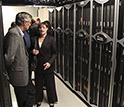News Release 12-204
NSF Supports Unique, High-Performance Supercomputer Center
The PRObE Center in Los Alamos is the world's first supercomputing system for large-scale systems research

PRObE's Oct. 18, 2012 grand opening event at Research Park in Los Alamos, New Mexico.
October 24, 2012
This material is available primarily for archival purposes. Telephone numbers or other contact information may be out of date; please see current contact information at media contacts.
With support from the National Science Foundation (NSF), the New Mexico Consortium, Los Alamos National Laboratory (LANL) and Carnegie Mellon University created and opened the PRObE (Parallel Reconfigurable Observational Environment) Center, a one-of-a-kind computer systems research center located at Research Park in Los Alamos, New Mexico.
Using $10 million in fundingfromNSF andemploying more than 2,000 recently retired computers from LANL, the PRObE Center will be the world's first facility where computer systems researchers have onsite and remote access to, and control of, a dedicated large-scale supercomputer for the testing ofsuper-computing and big-data-systems software.
The PRObE Center provides a platform where disruptive--and even destructive--testing may be done. Researchers will be given dedicated use of the PRObE clusters for days, or weeks, at a time. They will be allowed to replace any and all of the code and even inject faults that might be destructive to some equipment.
The New Mexico Consortium has used PRObE to engage the community's young people. Dozens of local undergraduates and high school students spent their summer and winter breaks assembling, testing and installing computers to create this world's largest large-scale, low-level systems research facility in their hometown. PRObE provides unique opportunities to college students who come to Los Alamos to learn about supercomputing.
Keith Marzullo, division director for Computer and Network Systems in NSF's Directorate for Computer and Information Science and Engineering, represented NSF at the PRObE opening. "This center fits well with the NSF mission goals of supporting foundational research, educating the next generation of researchers and supporting infrastructure underlying these," he began.
Marzullo called PRoBE a key piece of the intellectual fabric that will intertwine computer science research with a wide range of disciplines. He also noted the impressive collaboration of scientists, industry partners and other researchers, stating unequivocally, "PRObE will support a kind of research that would not otherwise be able to be done efficiently, effectively or--in many cases--at all.
"We at NSF are delighted that PRObE is ready to support a broad portfolio of systems research and education of service to the science community. It provides a wonderful example of cooperation between universities, companies, a national laboratory and the National Science Foundation. It promises to accelerate the pace of discovery and innovation in a wide range of disciplines."
U.S. Congressman Ben Ray Luján and LANL Director Charles McMillan were other keynote speakers at the event.
See a photo gallery of the PRObE grand openingevent.
Visit the New Mexico Consortium's website to learn more about PRObE.
-NSF-
-
LANL Director Charles McMillan and UNM's Susan Atlas tour the new PRObE Center on opening day.
Credit and Larger Version -
View the photo gallery showing PRObE center opening.
Credit and Larger Version
Media Contacts
Lisa-Joy Zgorski, NSF, (703) 292-8311, email: lisajoy@nsf.gov
Shannan Yeager, New Mexico Consortium, (505) 412-6898, email: syeager@newmexicoconsortium.org
Program Contacts
Keith Marzullo, NSF, (703) 292-8950, email: kmarzull@nsf.gov
Related Websites
Ribbon Cutting for the New PRObE Facility: http://www.newmexicoconsortium.org/news/world2019s-first-large-scale-high-performance-super-adcomputing-systems-research-facility-opening-at-new-mexico-consortium
One-of-a-Kind Center Opens: http://www.cmu.edu/homepage/computing/2012/fall/one-of-a-kind-center-opens.shtml
NMC's PRObE Center Ribbon Cutting Grand Opening: http://institute.lanl.gov/institutes/announcements/
Students Build World's First Experimental Supercomputer: http://www.lamonitor.com/content/students-build-worlds-first-experimental-super-computer
NSF's Directorate for Computer and Information Science and Engineering, Division of Computer Networking Systems: http://www.nsf.gov/div/index.jsp?org=CNS
The U.S. National Science Foundation propels the nation forward by advancing fundamental research in all fields of science and engineering. NSF supports research and people by providing facilities, instruments and funding to support their ingenuity and sustain the U.S. as a global leader in research and innovation. With a fiscal year 2023 budget of $9.5 billion, NSF funds reach all 50 states through grants to nearly 2,000 colleges, universities and institutions. Each year, NSF receives more than 40,000 competitive proposals and makes about 11,000 new awards. Those awards include support for cooperative research with industry, Arctic and Antarctic research and operations, and U.S. participation in international scientific efforts.
Connect with us online
NSF website: nsf.gov
NSF News: nsf.gov/news
For News Media: nsf.gov/news/newsroom
Statistics: nsf.gov/statistics/
Awards database: nsf.gov/awardsearch/
Follow us on social
Twitter: twitter.com/NSF
Facebook: facebook.com/US.NSF
Instagram: instagram.com/nsfgov




